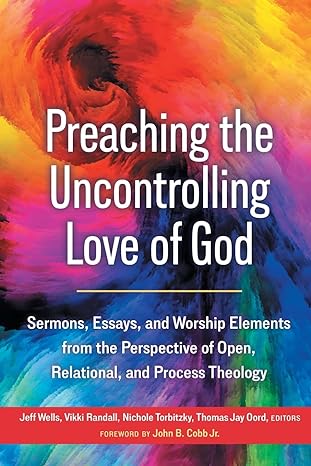Listening to a Sermon
with an Open and Relational Heart

"For decades, millions of Christians have been leaving church behind. Among those who have stayed, not only individuals, but entire congregations are rejecting traditions that fail to address the challenges of our contemporary world. They yearn, instead, for a profound relationship with the ever-present God who is loving, inclusive, persuasive, and uncontrolling.
This rich and diverse collection of sermons, essays, and worship elements explores how to preach, teach, and practice Open, Relational, and Process theological perspectives in local faith communities. It is a powerful resource for pastors, ministers of worship arts, lay church leaders, professors of preaching, worship, and practical theology, and anyone seeking a deep understanding of God that aligns with the Bible, science, and inclusive love and justice for all life on Earth."
This book lives up to its description. It offers resources for all of us who seek a renewal of church life, guided by faith leaders and creative congregations. Many of us believe that open and relational (process) theologies can help. Preaching the Uncontrolling Love of God features 67 contributors and 73 contributions from clergy and lay authors who belong to a variety of congregations: large, small, and in-between. Many of them are Protestant Christians, but the contents of submissions are relevant to Christians of all communions: Protestant, Catholic, Orthodox, African, Asian, Latin American, Pentecostal. I heartily recommend the book.
There is one essay that, to my mind, is missing and that concerns how laypeople, influenced by open and relational (process) theologies might listen to sermons in the spirit of open and relational theology: that is, with open and relational hearts. After all, a sermon is a process, and its 'success' depends on the active listening of those who hear the sermon as well as the content of the sermon and the style and mood of the giver. Moreover, it is not easy to be a pastor, a minister of worship arts, or even a theology professor in an age when millions of readers are leaving the church. How might we, as open and relational listeners, "listen" to a sermon in a generous, open and relational way? I offer twenty suggestions.
- Jay McDaniel
This rich and diverse collection of sermons, essays, and worship elements explores how to preach, teach, and practice Open, Relational, and Process theological perspectives in local faith communities. It is a powerful resource for pastors, ministers of worship arts, lay church leaders, professors of preaching, worship, and practical theology, and anyone seeking a deep understanding of God that aligns with the Bible, science, and inclusive love and justice for all life on Earth."
This book lives up to its description. It offers resources for all of us who seek a renewal of church life, guided by faith leaders and creative congregations. Many of us believe that open and relational (process) theologies can help. Preaching the Uncontrolling Love of God features 67 contributors and 73 contributions from clergy and lay authors who belong to a variety of congregations: large, small, and in-between. Many of them are Protestant Christians, but the contents of submissions are relevant to Christians of all communions: Protestant, Catholic, Orthodox, African, Asian, Latin American, Pentecostal. I heartily recommend the book.
There is one essay that, to my mind, is missing and that concerns how laypeople, influenced by open and relational (process) theologies might listen to sermons in the spirit of open and relational theology: that is, with open and relational hearts. After all, a sermon is a process, and its 'success' depends on the active listening of those who hear the sermon as well as the content of the sermon and the style and mood of the giver. Moreover, it is not easy to be a pastor, a minister of worship arts, or even a theology professor in an age when millions of readers are leaving the church. How might we, as open and relational listeners, "listen" to a sermon in a generous, open and relational way? I offer twenty suggestions.
- Jay McDaniel
